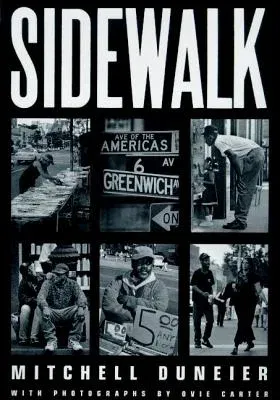An exceptional ethnography marked by clarity and candor, Sidewalk
takes us into the socio-cultural environment of those who, though often
seen as threatening or unseemly, work day after day on "the blocks" of
one of New York's most diverse neighborhoods. Sociologist Duneier,
author of Slim's Table, offers an accessible and compelling group
portrait of several poor black men who make their livelihoods on the
sidewalks of Greenwich Village selling secondhand goods, panhandling,
and scavenging books and magazines.
Duneier spent five years with these individuals, and in Sidewalk he
argues that, contrary to the opinion of various city officials, they
actually contribute significantly to the order and well-being of the
Village. An important study of the heart and mind of the street,
Sidewalk also features an insightful afterword by longtime book vendor
Hakim Hasan. This fascinating study reveals today's urban life in all
its complexity: its vitality, its conflicts about class and race, and
its surprising opportunities for empathy among strangers.
Sidewalk is an excellent supplementary text for a range of courses:
INTRODUCTION TO SOCIOLOGY: Shows how to make important links between
micro and macro; how a research project works; how sociology can
transform common sense.
RACE AND ETHNIC RELATIONS: Untangles race, class, and gender as they
work together on the street.
URBAN STUDIES: Asks how public space is used and contested by men
and women, blacks and whites, rich and poor, and how street life and
political economy interact.
DEVIANCE: Looks at labeling processes in treatment of the
homeless;
interrogates the "broken windows" theory of policing.
LAW AND SOCIETY: Closely examines the connections between formal and
informal systems of social control.
METHODS: Shows how ethnography works; includes a detailed
methodological appendix and an afterword by research subject Hakim
Hasan.
CULTURAL ANTHROPOLOGY: Sidewalk engages the rich terrain of recent
developments regarding representation, writing, and authority; in the
tradition of Elliot Liebow and Ulf Hannerz, it deals with age old
problems of the social and cultural experience of inequality; this is a
telling study of culture on the margins of American society.
CULTURAL STUDIES: Breaking down disciplinary boundaries, Sidewalk
shows how books and magazines are received and interpreted in
discussions among working-class people on the sidewalk; it shows how
cultural knowledge is deployed by vendors and scavengers to generate
subsistence in public space.
SOCIOLOGY OF CULTURE: Sidewalk demonstrates the connections
between culture and human agency and innovation; it interrogates
distinctions between legitimate subcultures and deviant collectivities;
it illustrates conflicts over cultural diversity in public space; and,
ultimately, it shows how conflicts over meaning are central to social
life.

